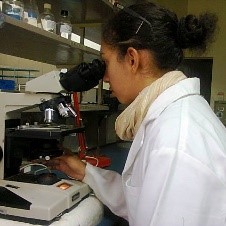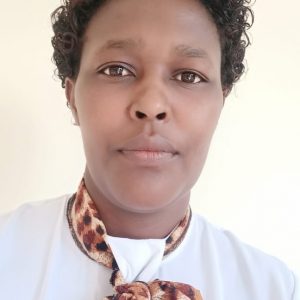Qualification: Msc. In Immunology
Email: vgent@jkuat.ac.ke
Research Interests: Immunology


The Department of Zoology is among the oldest Degree offering programmes in the Faculty of Science of Jomo Kenyatta University of Agriculture and Technology (JKUAT). The department was created in 1994 when the Department of Biological Sciences was split down to create the Biochemistry, Botany and Zoology Departments.
The University was founded in 1981 as a middle level college following a technical agreement between the Governments of Kenya and Japan. In 1988, it was elevated to a constituent college of Kenyatta University and was comprised of three faculties and one school; namely the Faculty of Science, Faculty of Agriculture, Faculty of Engineering and School of Architecture and Building Sciences. The constituent college was elevated to a fully pledged university by an Act of Parliament in November 1994.
UNDERGRADUATE DEGREE PROGRAMMES
The Department of Zoology offers 5 programmes:
Requirements
In addition, each student wishing to study Bachelor of Science Degree in the Department of Zoology must have satisfied the minimum requirement for the School of Biological Sciences, which is a minimum grade of C+ in Biology or Biological Science in KCSE (or equivalent examination). In addition, a student must have passed any two subjects from the following alternatives: –
| Alternative A | Alternative B | ||
| Chemistry- | C+ | Physical Science-
|
C+ |
| Mathematics- | C+ | Mathematics- | C+ |
Holders of KACE/GCE (“A” level) or Diploma qualifications in appropriate science subjects or another qualification deemed to be equivalent by the Senate may be considered. Requirements are given below:
EITHER
OR
OR
OR
Students who hold any of the qualifications (ii) and (iii) above may at the discretion of the Senate be admitted directly into the second year of the course in which case they may complete their courses in a minimum of three academic years and a maximum of five academic years
Students who hold the qualification (iv) above may at the discretion of the Senate be admitted directly into the third year of the course in which case they may complete their courses in a minimum of two academic years and a maximum of four academic years.
 Lab session (BSc. Genomic science students)
Lab session (BSc. Genomic science students)
BSc. GENOMIC SCIENCE
The Genomic Science Option essentially comprises of genetics and molecular biology and application of these to studying genetic materials of organisms. Advances in genomics are fundamental to solving societal functions, including health and medicine, food and agriculture, nanotechnology and manufacturing. Genetics is used in Forensic Science in identification of criminals through DNA
Target Group
High school graduates, diploma holders & technicians. Professionals such as technologists, nurses & those working in forensic laboratories, pharmaceutical, research institutes which require genomic science.
Job Prospects
Teaching & research institutions such as universities KEMRI, ILRI, KARI, National Public Health Laboratory, Welcome Trust Research, ICIPE, Health &Pharmaceutical industries /forensic laboratories, Criminal Investigation Department Laboratories (CID), Medico-Legal practitioners etc.
BSc. ENVIRONMENTAL SCIENCE
Environmental studies offer invaluable knowledge and skills to meet these challenges on a daily basis and offer possible solutions to key issues affecting people at all levels of society. They include enabling one to analyze environmental issues, use the information as tools in decision making, leading to sustainable exploitation and management of resources. This programme endows the user with appropriate skills and up-to-date knowledge for acquiring, processing analyzing and maintaining environmental information. It also provides the user with advanced analysis functionalities that allow complex environmental analyses to be performed. The duration of the course is eight semesters on full time basis. The course will comprise of theoretical and practical approaches necessary for orderly utilization of resources, the conservation and management of environment for systematic planning of sustainable national development.
Professional or students who are involved in natural resource management or aspire to acquire environmental information systems knowledge including but not restricted to:
Job Prospects
The graduates of the programme can work as a: environmental officer, research scientist/officer, academician (lecturer, teacher, and tutor), product sales specialist, environmental safety officer, or they can further their education in more advanced field of environmental sciences.
 Lab session (BSc. Applied Biology students)
Lab session (BSc. Applied Biology students)
BSc. APPLIED BIOLOGY
Applied Biology is the understanding of how organisms work from sub cellular to whole organism level. It involves the use of living organisms to produce useful products. It activities ranges from classical processes like brewing and cheese making to modern developments such as genetic engineering which can lead to new drugs against cancer and other diseases. Graduates of this programme may work in various biological laboratories, research institutions, pharmaceutical sector, food industry, agricultural sector or may go into gainful self-employment. The programme also provides a foundation for further training in biological technology, microbiology, biochemistry and molecular biology.
Target Group
Secondary school graduates and mature students from Institutions of Higher Education; especially those with ordinary level diploma in Biology and are interested furthering the education. Biological oriented personel working in institutional laboratories and allied industries etc.
Job Prospects
The graduate of the programme can work as a: laboratory manager, research scientist/officer, horticulturalist, academician (lecturer, teacher, tutor), microbiologist, product specialist, sales executive for biotech product, environmental safety officer, or they can further their education in more advanced field of Applied Biology such as cancer and stem cell research, proteomics and genetic engineering.
BSc. FISHERIES AND AQUACULTURE
The present nature of social-economic development requires new and environmentally, friendly means to utilize, conserve, and to manage fisheries resources. This call for a paradigm shift in the manner we seek solutions to our ever-growing demands from the limited fisheries resources we find on earth. To address this need, the Department of Zoology at Jomo Kenyatta University of Agriculture and Technology has developed an undergraduate degree programme in Fisheries and Aquaculture Sciences. The degree programme introduces the upcoming professionals to Fisheries and Aquaculture Sciences and their appropriate means of addressing them for exploitation and conservation of natural resources in our environment. Much emphasis is put on practical applications to empower professionals and impart them with hands on experience required for various Fisheries and Aquaculture technology applications. Upon the completion of the study, graduates will have acquired skills, knowledge, and attitudes in Fisheries and Aquaculture Sciences to enable them to be actively involved in efficient management of fisheries and aquaculture resources.
Target Group
Higher educational institution graduates and diploma holders, especially those working in fish farming enterprises and allied industries that may require to further their knowledge in this area, secondary school leavers.
Job Prospects
The graduates of the programme can work as a: Fish Farm manager, research scientist/officer, academician (lecturer, teacher, tutor), product sales specialist, sales executive for biotech product, environmental safety officer, or they can further their education in more advanced field of Fisheries and Aquaculture Technologies.
 Lab session (BSc. Zoology students)
Lab session (BSc. Zoology students)
BSc. ZOOLOGY
Physiology is an integrative discipline that explores how living organisms function at the molecular, cellular, and organismal levels. Animal physiology is the study of the internal physical and chemical functions of animals. Professionals in this field will explore the makeup of animals, including their genetics, their behaviors and their biological structure.
Applied Entomology Option will provide the student with the understanding of the diversity of the insect world and the impact of insects on mankind. Molecular entomology will introduce students to the application of molecular technologies and biotechnologies to traditional entomological topics. This will be done by introducing the students to common insect species through visual slides, laboratory specimens, and by actively collecting and identifying insect specimens. In addition, lectures on a variety of current topics in insect bionomics, physiology and pest management will be given based on local examples. It is anticipated that at the end of the course students will be equipped with relevant knowledge and skills suitable for application in the job market.
Target Group
High School graduates and diploma holders and professionals such as those working in laboratories, museum and pharmaceutical industries that require the knowledge and applications of zoology in their day-to-day work.
Job Prospects
A degree in Zoology (Animal Physiology/Applied Entomology Options) can lead to opportunities in a wide variety of areas including:
POSTGRADUATE DEGREE PROGRAMMES
The Department of Zoology offers research training opportunities at both MSc and PhD level in the following areas of specialization:
The MSc. courses are offered either as a full-time student (coursework, research and thesis) for a period of two years, or as a part-time student (Research and Thesis) for three years. PhD courses are offered through research and thesis only and for a period of three years.
Entry Requirements
The common regulations for all Masters degrees in the University shall apply.
The general regulations for all Masters degrees in the School of Biological Sciences shall apply.
The following shall be eligible for registration for the Master of Science in the Department of Zoology:
1. Shadrack M. Muya, Phylogeography and population genetic structure of the Kenyan black rhinoceros (Diceros bicornis michaeli Gorves1967), PhD Thesis
2. Zipporah B. Osiemo, Molecular phylogenetic study of fungal symbionts of fungus-growing termites and DMA bar-coding of termites for biodiversity assessment in Kenya.
PhD Thesis
3 Razafindranaivo Victor, Studies on the Nymphal aggregation Pheromone of Malagasy Migratory Locust, Locusta migratoria cap/to Sassure, 1884 and its effects on adult maturation, PhD Thesis
4 Razafindraleva H. Andrianiana, Study on the aggregation pheromone of adult Malagasy migratory locusts, Locusta mitratoria capito (Saussure, 1 884) and its effects on conspecific nymphal stages, PhD Thesis
5 Paulina Nana, Integrating Tick attraction Aggregation attachment Pheromone (AAAP) and Kairomones from Calpurnia Aurea with entomopathogenic Fungi for the control of Rhipicephalus Appendiculatus and Amblyomma Variegatum, PhD Thesis
6 Andrew Ambogo Obala, The seasonal abundance of Anopheles gambiae group and malaria transmission in a fringe area of Western Kenya, PhD Thesis
7 Grace K. Nyambati, A comparative study to determine the use, efficacy and toxicity of local herbs as eth no-medicines against malaria in Trans-Mara, Kuria and Suba regions of Kenya, PhD Thesis
8 Donald Kachigamba A comparative study of host marking behaviour and pheromones in six fruit fly species (dipteria tephritidae) infesting mango (mangifera indica) in Kenya, PhD Thesis
9 Josephine M. Karanja, Evaluation of French Bean Cultivars for their Susceptibility to Thrips and the effect of Nitrogen Fertilizer on Thrips population Dynamics on the French Beans in Kenya, MSC Thesis
10 Wamonje Francis Onono, Immunodulatory effects of Brucella on Cytokine Production that promote Spontaneous Abortion in Mice,MSC Thesis
11 Suzy Muchika, Antischistosomal effect of Solanum incanum and carica papaya crude extracts on the parasite Schistosoma mansonii mansonii in vivo and in vitro,
MSC Thesis
12 Nganga Joseph Waweru, Population Dynamics and Integrated Pest management of Thrips using Entomopathogenic Nematodes on French Beans,,
MSC Thesis
13 Okoth Evans Ouma Raballah, The Effects of Interferon gamma-183(G/T), -1616 (A/G) and 2200 (A/G) Variants on Malarial Disease outcomes in Children Naturally-Exposed to Plasmodium falciparum, MSC Thesis
14 Oduor Michael Aduol, Assessment of Gastro-intestinal Parasites of captive Olive Baboons, Papio Cynocephalus Anubis, at the Institute of Primate Research,
MSC Thesis
15 Fredrick Kaingu Baraka, A study on the prevalence of endo-parasites in indigenous chicken and the activity of crude extracts (Aloe secundiflora) against Ascaridia galli in-vitro, MSC Thesis
16 Peninah Njoki Muchira, Determination of efficacious praziquantel dose in different mouse strains: Balb/C and Swiss Mice for treatment of Schistosoma Mansonii,
MSC Thesis
17 Marion Wangui Kiguoya, Epitope specificity and polyfunctional CD4+ responses in HIV-1 highly exposed seronegative versus infected female commercial sex workers,
MSC Thesis
18 J t Kennedy Muna, Haemoglobin as a simple marker of HIV disease progression among ARV naive patients in Nairobi, MSC Thesis
19 Mwangi Zachary Mbui, A study on prevalence of malaria in children aged 10 years and below attending Thika District Hospital, Research Project
20 Mose M. Philip, Analysis of Biological Hazard Contamination in several Departments of JKUAT, Research Project
21 Muriuki James Murimi, A study on prevalence of Intestinal Protozoa in Primary School going Children in Uthiru and Kangemi, Nairobi, Research Project
22 Oduor Joseph Michael Ochieng, Investigation of the Susceptibility of oral Pathogenic Bacteria to local Dentifrices, Research Project
23 Anastasia Wangari Njeru, Prevalence of Tuberculosis among HIV/AIDS patients attending the Chest Clinic in Embu Provincial Hospital, Research Project
24 Francis K. Kahiro, Identification of the side effects associated with Antiretroviral Drugs among HIV/AIDS Patients attending Thika District Hospital,
Research Project
25 Ontita Omwembi, Assessment on Epidemiology, occurrences of Human Cysticercosis – Emerging Parasitic Disease and its Economic importance, Research Project

Qualification: Msc. In Immunology
Email: vgent@jkuat.ac.ke
Research Interests: Immunology

Qualification: MSc. In Molecular Biology and Bioinformatics
Email: daniel.mutwiri@jkuat.ac.ke
Research Interests: Zoonotic pathogens and diseases, Bioinformatics

Qualification(s): PhD in Medical Entomology and Parasitology

Tel: +254-67-52711-Zoology
FAX: +254-67-52089
Postal address
P.O. Box 62000-00200 Nairobi
Physical Address
Juja Market, Off Nairobi-Thika Road
email: zoo@fsc.jkuat.ac.ke